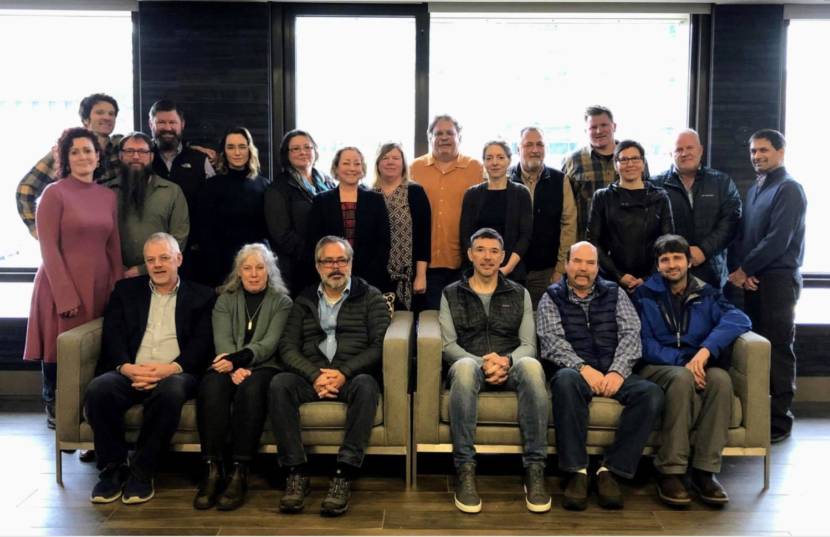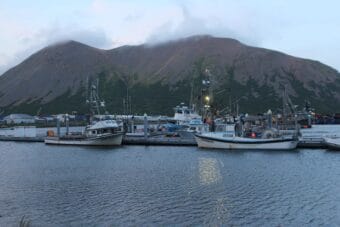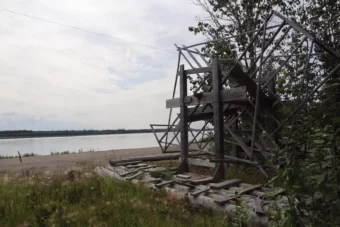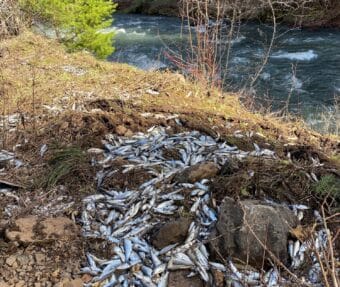
The North Pacific Fishery Management Council often flies under the radar, meeting in dimly lit conference rooms and delving into technical questions about fish stocks and ecosystems. But it has a hugely important job: conservation of species and managing offshore fisheries for species like cod, pollock and crab, which are huge economic drivers for coastal communities on the Bering Sea and Gulf of Alaska.
At the end of last year, the council went into a closed door meeting. When it emerged, it had eliminated two seats on its key advisory panel: Ernie Weiss of Anchorage who had reached his cap for reappointment on the panel, and Natasha Hayden of Kodiak, a vocal advocate for smaller vessels and Alaska Natives, who had been seeking reappointment.
The blowback of Hayden’s ouster was immediate, especially among stakeholders advocating for Indigenous voices in fisheries management.
At the council’s February meeting, more than 20 people — from conservation council representatives, to well established commercial fishermen, to policy directors at Native non-profits — provided public testimony calling for Hayden’s reappointment.
“This is a time when we should be adding more Indigenous voices to council bodies and not less,” Marissa Merculieff, director of justice and governance administration for the Aleut Community of St. Paul Island Tribal Government, told the council.
The tribal government runs affairs for the Pribilof Island community in the Bering Sea.
Merculieff says Hayden represented an essential voice for Alaska Native and fishing-dependent communities.
St. Paul’s tribal government representatives, like Ecosystem Conservation Director Lauren Divine, said they lost a key ally with Hayden’s departure.
“It was a huge loss for Indigenous communities and Indigenous voices in the council process,” Divine told KUCB. “And that’s why there was so much outrage — at a time when we were really hoping that the council would hop on the racial equity movement.”
Native communities already are underrepresented in fisheries management, she said. And that’s a problem because the health and management of fish stocks are a big deal for communities that rely on commercial fishing and subsistence.
Hayden was born and raised in Kodiak. She’s from an Indigenous Alutiiq family and the daughter of a commercial fisherman and subsistence harvester. She and her husband own a commercial vessel and fish in federal waters. And as vice president of lands and natural resources for the Afognak Native Corporation, she told KUCB she was well-qualified for fisheries management.
“I’m a civil engineer. I’m an elected tribal member,” she said. “What else do you have to do to be considered worthy to participate in the process?”
It’s not unusual for the council to adjust the number of seats on its advisory panel, which are not designated to any particular stakeholders or geographical areas. And the council generally makes these types of decisions over appointments behind closed doors.
But their removal of Hayden didn’t quite add up, says Heather McCarty who works government affairs for the Central Bering Sea Fishermen’s Association.
“Normally, unless people have been obviously incompetent or inappropriate or absent, those reappointments are without issues,” said McCarty who’s been involved with the council process for roughly 20 years. “There’s no reason to remove somebody if they wanted to have another three years.”
She wouldn’t speculate why the council eliminated Hayden’s seat, but she said council members should provide that explanation.
However, that hasn’t happened. While KUCB reached out to all Alaska-based voting council members as well as Alaska Department of Fish and Game officials — who oversee Alaska’s representatives — none would speak publicly about why Hayden was removed.
The council’s full-time Executive Director David Witherell released a short statement in response to questions from KUCB.
“The council evaluates the relative representation across the fishing sectors and geographic areas, as well as the expertise, performance and attendance of [advisory panel] members and the expertise of the nominees based on their nomination letters and resumes,” Witherell wrote in an email.
The relative silence and gaps in understanding have left others to fill the void with speculation.
Critics said that some of the big corporate players in Alaska’s federal fisheries can often drown out the perspectives of smaller members of the fleet.
Advisory panel member Julie Kavanaugh, also of Kodiak, said Hayden was a well-balanced representative. She had been an effective advocate for Alaska Natives as well as smaller fishing boats — those less than 60 feet — but Kavanaugh also noted that there were several other small boat operators on the panel.
“Natasha was one of four people that own and or operate a vessel that is in that 60-foot-and-under class,” she said. “And I think that that was a really easy thing to pick out and highlight as being repetitive on the [advisory panel] and gave credence to maybe not reappointing her.”
Kavanaugh said it’s unfortunate that Hayden’s representation of the Alaska Native community wasn’t considered worthy enough for her to keep her seat.
Brian Ritchie of Homer, who was appointed to the panel this year, said he doesn’t think her removal had to do with race or politics. Like others, Ritchie said it was as simple as bringing the panel back down to 20 seats. There are still 11 Alaskans on the 20-member panel, which also has representatives from Oregon and Washington, as the council manages species that affect federal fisheries in that region.
“I don’t think that this is an instance of systemic racism,” Ritchie said. “I think that fisheries in Alaska are very nuanced and I don’t think that the council has currently, or in the future, any plans to limit Indigenous representation or opportunities.”
The council itself, unlike at least one other management council outside of Alaska, doesn’t have a designated tribal seat. But it has implemented some outreach efforts to improve communication with rural and Alaska Native populations, such as the Community Engagement Committee and task forces designed to incorporate traditional and local knowledge and subsistence information into the council decision making process. In response to a recommendation from the CEC, the council is working to assign responsibilities for a rural fisheries community or tribal liaison position to an existing staff member.
But because sitting council members refuse to say why they eliminated her seat, Hayden said she can’t give them the benefit of the doubt.
“If they truly wanted to have equitable participation by Alaska Native people, they wouldn’t have eliminated me,” Hayden said.
The newly constituted advisory panel held its first meeting in February and met again this month. And while at least two Alaska Native members remain on the advisory panel, according to the council’s data on advisory panel representation, none identify as representing tribal governments, ANCSA regional or village cooperatives, or regional Native nonprofit associations.



